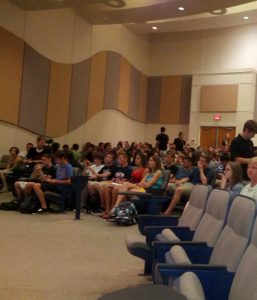Teaching
Statement
I believe that, at its core, all rhetorical instruction should be centered on the development of tools for thinking about the articulation of experience, knowledge, tools, and action; in other words, rhetorical instruction should be problem-based. To this end, I work with students to investigate points of articulation, in the sense of both “linking” and of “giving words to,” between our histories, ourselves, texts, and technologies. This involves two key design elements for me as an educator. First is a process that focuses on the translation of experience into usable knowledge and second the creation of texts, broadly defined, that aid in the translation of experience into usable knowledge for others.

What does it look like in the classroom?
I see my teaching and my research as a deeply intertwined series of practices with the same political and educational commitments to access and pedagogical innovation. My class designs invite students to bring their own professional and personal worlds into projects in a rigorous way. Students’ conceptual worlds, discourses, and professional aspirations make up a large part of the content of my classes and become the rhetorical work we theorize about. For example, students are using Twitter to expand participation in the class beyond the geographic space of the university. If you were to attend my graduate course on social justice and usable design, you would see me helping my students navigate field research with populations of their own choosing but also building and designing design schematics for applications that addressed social justice needs. If you were to attend my Introduction to Professional Writing classes, you would see students thinking about, researching, designing, and creating textual and digital tools that not only articulate for users but also for themselves, employers, and professions.
What does it look like as a mentor?
I advise young scholars about professional digital identity and help with the creation of multimedia representations of their work helping these young scholars negotiate, think about and make choices for themselves about their emerging professional-personal sense of self. We think about ways of code meshing and the decisions that come with competing discourses, through academic paper presentation, online persona management, or discussing the right way and challenges to “give back,” to their home communities. If you were to attend a meeting between me and one of these young scholars you would hear us discussing not just professional concerns but lifetime career issues.
I engage in the same sort of praxis that I try to help build for my students. This act of understanding is not easy. It is not a goal to be achieved but rather, in my mind, it is a way of building. It is a mindful mental state of action and reflection. I believe in presenting myself as receptive to other’s identities, experiences, social subjectivities, and technologies, I invite students to participate in that act. This is how one obtains knowledge; in the act of attempting and reflecting in the real world.